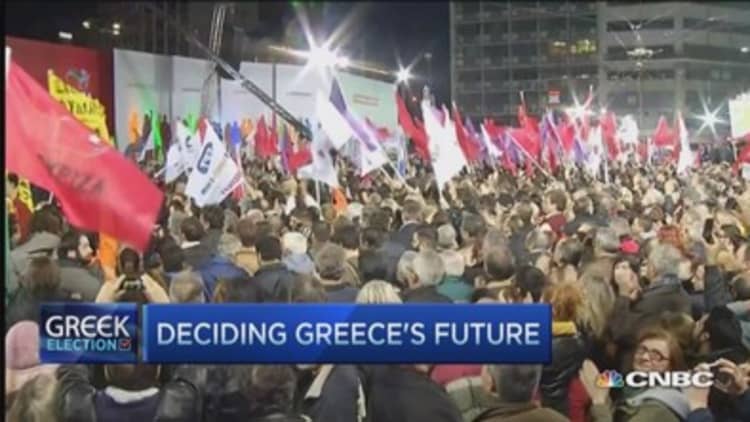
With the European Central Bank signing up for a large bond-purchasing program, the next obstacle for the European Union is the election in Greece.
Greek voters elect a new parliament on Sunday, with the anti-austerity opposition party Syriza favored to win, but without an overall majority.
"For all markets, if they gain control, all bets are off. We do not think it is possible for Greece to exit the EU. Or they could if they want to commit sovereign suicide," John De Clue, chief investment officer at the private client reserve at U.S. Bank Wealth Management, said.
The polls put Alexis Tsipras and Syriza ahead of the ruling New Democracy party of Greek Prime Minister Antonis Samaras.
Tsipras has vowed to convince the ECB and euro zone to write down the value of their Greek debt holdings to allow him to increase public spending and stimulate job growth.
"There is a good chance they could win, and if they begin moving away from fiscal austerity, other members of the EU are going to say: 'No more lending, no more life support.' On Monday morning you'll know," De Clue said.
"It's one thing when a country debases its currency, but imagine if all of a sudden, Greece is not using euros any more, what does that mean? They would have a run on banks," De Clue said.
Markets will find it difficult not to stumble if Tsipras wins a majority, as it could reignite talk of a European meltdown, and could specifically be the reason that the ECB made its bold move Thursday, in anticipation of Greece, De Clue said.
The Greek elections bring an "air of uncertainty" to global markets but will probably be a "nonevent," Bruce Bittles, chief investment strategist at RW Baird & Co., said.
"Syriza no longer wants to leave the euro, and Europe is less vulnerable to a Greek exit than three years ago. However, any further crisis in a peripheral country is clearly unwelcome in a region which is long overdue for an economic recovery," David Kelly, chief market strategist at J.P. Morgan Funds, wrote in emailed commentary.
After borrowing nearly $278 billion from the EU and International Monetary Fund, it'll be up to the next Greek government to negotiate a final bailout tranche.
The worst economy in the euro zone is tied to a bailout accord that gives it financial aid in exchange for regular inspections by the IMF, the European Commission and the ECB reforms put in place in large part due to Germany.
"Going into the weekend, (if) the Syriza party does win the election and we have a gridlock situation between Greece and its lenders. This situation is perfectly capable of elevating the volatility in the market towards its peaks and erasing all the gains which could have taken place as a result of the ECB's QE announcement," Naeem Aslam, chief market analyst at AvaTrade, said in an email.
ECB President Mario Draghi said on Thursday that the ECB would not hold more than 33 percent of the debt of a single issuer, an edict that excludes Greece from accessing the ECB's bond-buying program until at least July.
The ECB since 2010 has taken Greece's junk-rated government debt and state-backed securities as collateral in its refinancing operations so long as Greek goes along with austerity steps and reform promises made in a rescue agreement with the euro zone and the IMF.
Regardless who wins the election, the heightened unease between Athens and its creditors means that either Tsipras or Samaras will find a tough road in satisfying Europe and the IMF without politically unpopular moves at home.


